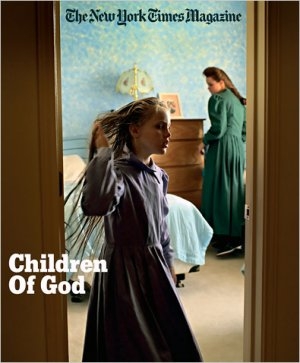BY SARA CORBETT FOR THE NEW YORK TIMES On a humid Wednesday in late June, as she waited to be summoned by a grand jury, 16-year-old Teresa Jeffs hitched up her navy blue prairie dress and hoisted herself into the crooked arms of a live oak tree that sits in front of the Schleicher County Courthouse in Eldorado, Tex. For a few minutes, she was not — as has been speculated about many of the young women of the Fundamentalist Church of Jesus Christ of Latter-day Saints, or F.L.D.S. — a possible child bride, or a sexual-abuse victim, or a member of an out-of-touch, polygamous religious sect. She was just a kid in a tree, perched serenely above the heads of all the lawyers, reporters and sheriff’s deputies — a moon-faced girl with an auburn coxcomb of hair and a mischievous grin.
 We understand so little about the view from that tree, about what the world known simply as “outside” looks like to someone like Teresa Jeffs, who was among more than 400 minors forcibly removed from the Yearning for Zion Ranch, which belongs to the F.L.D.S., in early April.
We understand so little about the view from that tree, about what the world known simply as “outside” looks like to someone like Teresa Jeffs, who was among more than 400 minors forcibly removed from the Yearning for Zion Ranch, which belongs to the F.L.D.S., in early April.
Even after the calls that triggered the military-style raid on the ranch were suspected to be a hoax, Texas child-welfare officials persisted in claiming that F.L.D.S. children were endangered by what they deemed to be a pattern of sexual and physical abuse at the ranch. Those claims have yet to be proved — the Texas Supreme Court ruled that officials had overstepped their authority, and in early June the children were ordered to be returned to their families — but child-welfare and state criminal investigations continue. Investigators have reportedly taken D.N.A. samples from some 600 F.L.D.S. members, including children, presumably in an attempt to establish a biological link between under-age mothers and older men (in Texas, the legal age for marriage is 16 with consent; 17 for unmarried sexual contact when there is an age difference of more than three years). In addition, a handful of the sect’s young women have been subpoenaed by a Texas grand jury.
Only a small number of families have returned to the ranch, according to Willie Jessop, a spokesman for the ranch, who says many of its former residents fear the possibility of more government interference and have opted to try to live quietly elsewhere, while continuing to adhere to F.L.D.S. principles.
Two weeks ago, the photographer Stephanie Sinclair was given rare and intimate access to some of the young women who have found themselves at the center of the often-bilious battle between the state of Texas and the F.L.D.S. What’s interesting is that in a case that is, at heart, about doctrinaire male authority, and supposed abuse committed by men, it’s the women of the F.L.D.S. who have largely had to assume a public mantle these past months, making court appearances, trying to defend both their faith and their lifestyle in the face of deep skepticism. MORE
